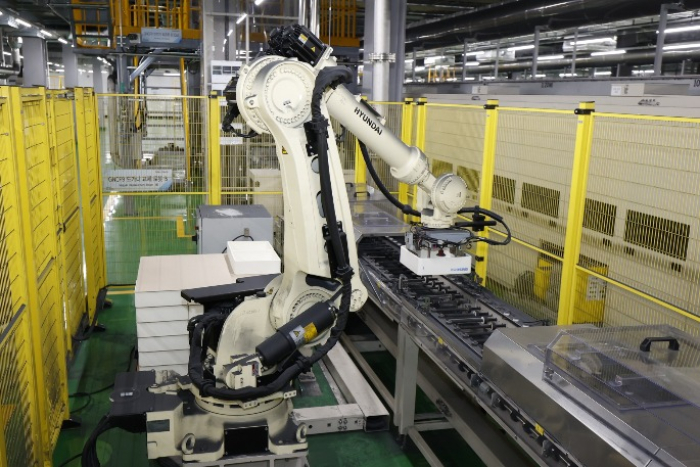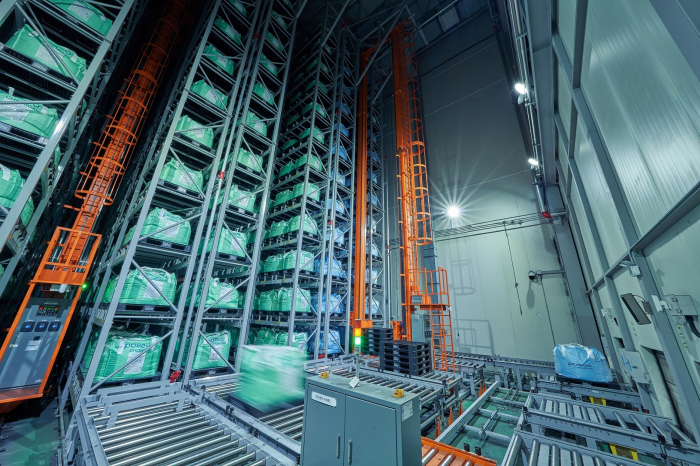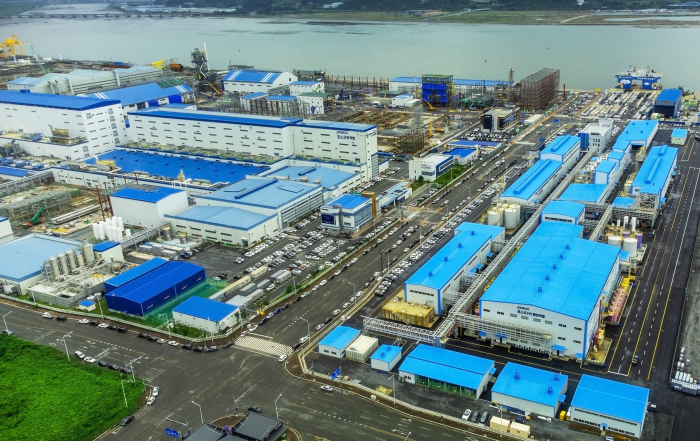Batteries
POSCO Future M spurs single-crystal cathode production
The plant is the world's largest single factory by manufacturing capacity, supplying cathodes to 1 million EVs a year
By Jul 23, 2023 (Gmt+09:00)
3
Min read
Most Read
LG Chem to sell water filter business to Glenwood PE for $692 million


Kyobo Life poised to buy Japan’s SBI Group-owned savings bank


KT&G eyes overseas M&A after rejecting activist fund's offer


StockX in merger talks with Naver’s online reseller Kream


Mirae Asset to be named Korea Post’s core real estate fund operator



GWANGYANG – POSCO Future M Co., the battery materials unit under South Korean steel giant POSCO Holdings Inc., is spurring production of single-crystal cathode, which is touted as a game changer in the global electric vehicle battery industry.
The cathode plant in POSCO’s Gwangyang Steelworks in South Jeolla Province was producing 230 tons of the key EV battery component per day as of last Thursday when the site was open to media.
The company, formerly POSCO Chemical, boasts 90,000 tons of cathode production capacity a year. It is the largest in the world as a single factory and can be used for 1 million new electric cars.
In the factory, dark brown lumps of cathodes were heated to 900 degrees Celsius and baked at a rate of 56 kilograms every eight minutes. Cathodes, which account for nearly half of battery costs, came out in three tiers and four rows in a mold from a 55-meter-long heat treatment equipment.

SINGLE-CRYSTAL CATHODES
POSCO Future M began supplying single-crystal cathodes to Ultium Cells LLC in April of this year, a US battery cell joint venture between Korea’s LG Energy Solution Ltd. and auto giant General Motors Co.
Compared with conventional cathodes, single-crystal cathodes can reduce fire risk during the process of charging and discharging, enhance stability and increase a battery's lifespan.
According to POSCO Future M, the cathode factory’s production yield, or percentage of non-defective items, exceeds 90%. The facility will expand the production capacity of single-crystal cathodes from the current 6,000 tons per annum to 7,800 tons in the near future.
POSCO Future M began cathode production in 2019, entering the business later than its local peers such as LG Chem Ltd., EcoPro BM Co. and L&F Corp. Today, the company is a leader in mass production of the key battery components thanks to its smart factory system.
The unmanned system uses air pressure that can transport product samples to the quality control room at five meters per second.
The smart warehouse, with a floor area of 5,340 square meters and a height of 20 meters, stores 12,000 tons of cathode ingredients – lithium and precursors – and uses the automatic system to move the materials and cathodes.
“The factory is very busy. About 500 kilograms of cathode materials are used up within three days,” a POSCO Future M official said.

FROM SMELTING LITHIUM TO RECYCLING USED CELLS
The construction of POSCO-Pilbara Lithium Solution plant, a lithium hydroxide monohydrate conversion facility, is underway in the cathode production factory nearby.
The plant will produce 43,000 tons of lithium hydroxide in two different processes: pouring caustic soda into lithium sulfate; and water electrolysis.
POSCO and Australian lithium mining company Pilbara Minerals Ltd. set up a JV with 82% and 18% stakes, respectively, in October 2021 to establish the plant. The construction is scheduled to be finished in October of this year.
Near the lithium hydroxide facility, POSCO HY Clean Metal Plant is under operation to recycle used batteries. The new factory was constructed on July 7.
The plant is run by POSCO-GS Eco Materials, a JV between POSCO Holdings and GS Energy Corp., and China’s Huayou Cobalt Co. The JV and Huayou hold 65% and 35% stakes, respectively, in the plant operator.
The facility extracts 2,500 tons of nickel, 800 tons of cobalt and 2,500 tons of lithium carbonate per annum from used batteries. The plant aims to take 99% of the nickel and 90% of the lithium during the recycling process, POSCO Future M said.
POSCO Holdings is boosting the synergy effect of the three factories – the cathode plant, POSCO-Pilbara and POSCO HY Clean Metal – by locating them close to each other on a site of 532,000 square meters.
POSCO Future M will intensify the battery businesses from smelting materials like lithium to recycling used cells, aiming for 1 million tons of cathode production per annum by 2030.
Write to Mi-Sun Kang at misunny@hankyung.com
Jihyun Kim edited this article.
More to Read
-
 BatteriesLG Chem produces single-crystal cathodes; to raise $1.5 bn in bonds
BatteriesLG Chem produces single-crystal cathodes; to raise $1.5 bn in bondsJun 26, 2023 (Gmt+09:00)
2 Min read -
 BatteriesPOSCO Future M-GM JV to receive investment from Canadian gov’t
BatteriesPOSCO Future M-GM JV to receive investment from Canadian gov’tMay 30, 2023 (Gmt+09:00)
1 Min read -
 BatteriesPOSCO Future M to supply LG Energy Solution $22.6 bn worth of cathodes
BatteriesPOSCO Future M to supply LG Energy Solution $22.6 bn worth of cathodesApr 26, 2023 (Gmt+09:00)
3 Min read -
 BatteriesPOSCO Future M to inject $461 mn to bulk up cathode production
BatteriesPOSCO Future M to inject $461 mn to bulk up cathode productionApr 24, 2023 (Gmt+09:00)
2 Min read -
 AutomobilesKorea’s LG Elec, POSCO Future M receive GM supplier awards
AutomobilesKorea’s LG Elec, POSCO Future M receive GM supplier awardsMar 26, 2023 (Gmt+09:00)
1 Min read
Comment 0
LOG IN


